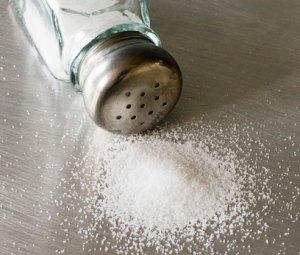Okay. There it is.
Fact is, I can’t stand bland food. I’m always sneaking extra salt into things. I once heard a professional chef say that the difference between a good meal and a great meal is a box of salt. And, admittedly, I subscribe to that line of thought.
This is a big *gasp*, right? How dare I call myself a doctor, right? I might as well take up smoking. Right??
Well, let’s see.
Recently, the evidence on salt has become controversial. Big time.
This guy here is one of the outspoken ones, fearlessly flying in the face of all the conventional nutrition wisdom. Also an MD. And he backs his thoughts up with research.
Because there is, indeed, recent research that is calling into question our long-held beliefs about salt.
Here, the New York Times discusses a recent study from the Journal of the American Medical Association that showed an association between salt restriction and an increased risk of death from heart attacks and stroke. It also found that cutting salt didn’t even reduce blood pressure. The study had some flaws (as most studies do, in one way or another) but it was intriguing, nonetheless.
In July 2011, the Cochrane Database of Systematic Reviews published a thorough analysis of all studies that looked at salt restriction and mortality or heart disease. And they failed to show strong evidence of any effect of salt reduction.
So…all this time, we’ve been laboring under the belief that reducing salt reduces heart disease…but there’s insufficient evidence to support that belief?
Well, not so fast. Failure to show an effect does not mean absence of effect. It may be there, we just haven’t proven it yet. I guess the bottom line, here, is that there is no bottom line. I don’t think we have enough evidence for or against salt intake. Which is surprising, given the vigor of mainstream nutrition advice to “cut the salt”. Dogma? Maybe so.
So what’s my advice on this?
For some people, it’s an easy answer: Got hypertension? Got congestive heart failure? Cut the salt.
For the rest? Well, it’s a little more gray. I’m hoping it’s something that all those hardworking scientists, busy in their labs, will sort out for us. Soon, preferably. I may very well be proven wrong, here, for not having a zero-tolerance policy on sodium. In which case, I’ll have to change my tune.
But in the meantime, here’s what I would suggest: monitor your BP regularly. Eat well. Limit excess sodium but don’t feel you have to be a salt nazi. The best way to keep your salt intake reasonable? Avoid processed, pre-packaged food. Eat whole, real food. Because it’s not so much the dinner-table salt shaker that causes our daily sodium to skyrocket–it’s more the hidden salt in soup cans and frozen dinners that’s the real culprit.
Like this Wicked Healthy thinking? Read these next:







